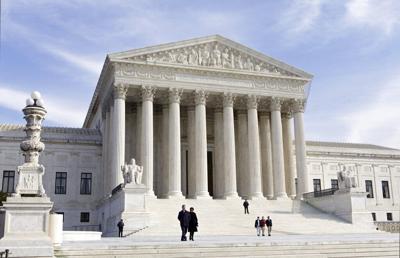WASHINGTON – Within hours of Thursday’s stunning U.S. Supreme Court decision that effectively requires Alabama to draw a second majority-Black congressional district, The Cook Report, a respected political handicapper, changed its 2024 election prognosis for two Louisiana Republicans – U.S. Reps Julia Letlow, of Start, and Garret Graves, of Baton Rouge – from “Solid GOP” to “Toss Up.”
Cook could have easily included U.S. Rep. Mike Johnson – the Benton Republican who ranks fifth in the House majority leadership – because his northwest Louisiana seat also could have a bull’s eye on it once the Louisiana Legislature sits back down to decide where a second majority-Black congressional district will go in this state.
The 5-4 Supreme Court decision touches 31 redistricting cases that raise the same claims under Section 2 of the federal Voting Rights Act that drove the Alabama case, according to Democracy Docket.
That means the possibility of a dozen new congressional districts that are competitive for minorities. But that’s in the future and dependent on how facts are interpreted in the individual cases.
Closer at hand is Louisiana, which already is sitting on a lower court ruling that found that legislators last year gerrymandered congressional districts to diminish Black voters, who make up a third of the voting-age population.
Legislators spread Black voters among five predominantly White congressional districts and packed as many possible to make up a majority in the one majority-Black district. As a result, Louisiana voters sent five White Republicans and only one Black Democrat to the U.S. House.
Chief U.S. District Judge Shelly Dick, of Baton Rouge, on June 6, 2022, ordered the state Legislature to redraw the congressional districts in a way that would give Black voters more of a say in two districts instead of one.
Her order was put on hold while the high court deliberated the Alabama case.
Louisiana Gov. John Bel Edwards, whose veto of the Louisiana maps was overridden, told reporters Thursday night that he expects Louisiana's case to restart as soon as the Supreme Court’s decision is returned to the 5th U.S. Circuit Court of Appeals in New Orleans for an interpretation on how the high court’s wording applies to the cases consolidated in Dick’s trial level court.
The NAACP Legal Defense Fund, which represented the voters and organization raising the legal challenge, told reporters Thursday that it's ready to go.
Left unsaid is that 77% of Louisiana’s nearly 1 million Black voters registered as Democrats. The addition of a second majority-Black district could turn one of those safe Republican congressional seats Democratic. Republicans hold a thin 10-seat majority in the U.S. House.
State Sen. Sharon Hewitt, the Slidell Republican in charge of redistricting in the state Senate, said Thursday that Alabama’s case differs from Louisiana’s and she expects the courts to find that only one majority-Black district is appropriate for this state.
Two of the dozen Democratic proposals gained traction last year before Dick’s order was sidelined.
State Sen. Cleo Fields, D-Baton Rouge, proposed turning Letlow’s 5th Congressional District – whose voters today comprise 32% of the Black voting-age population – into one that has a 54% Black voting-age population.
Democratic U.S. Rep. Troy Carter’s majority-Black district, which stretches from New Orleans East to north Baton Rouge, would go from 60% Black voters to 53% Black voters under Fields' plan.
The second proposal was sponsored by then-state Sen. Rick Ward, R-Port Allen. Under his configuration, Black majorities in Carter’s and Graves’ districts would each total a little more than 50%. Graves' district now is about 66% White.
And for more than a decade, Democrats have hawked the idea of turning the two vertically-drawn districts based in north Louisiana into one horizontally-drawn district along Interstate 20. That plan would link the blue cities of Monroe and Shreveport and diminish Republican domination of both seats through rural populations. The result would be a 50-50 partisan split.
Letlow, Graves, and Johnson did not respond to requests for comment on this issue.
Louisiana legislators could pick up one of those three maps or start over from scratch.
“We have a long way to go to ensure that all people can vote, have their vote counted and elect candidates of choice,” said Ashley Shelton, president and CEO of the Power Coalition for Equity and Justice, a New Orleans-based grassroots voter organizing group.

